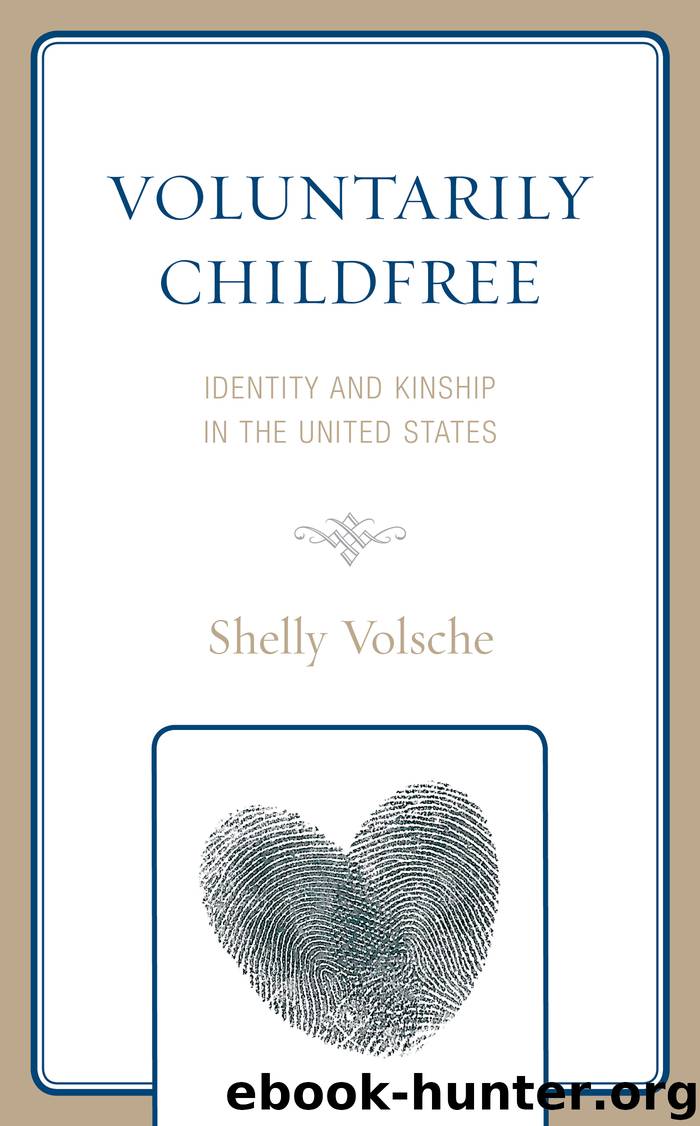Voluntarily Childfree by Shelly Volsche

Author:Shelly Volsche
Language: eng
Format: epub
Tags: undefined
Publisher: Lexington Books
Published: 2012-03-10T16:00:00+00:00
Awareness of Parenting Requirements
Ask any parent—to do the job well is not always easy. While the choice to remain childfree is viewed as selfish by the dominant discourse, many within the childfree see it as the most selfless thing they can do. Childfree observations of parenting report that it is often less a decision and more an automatic process. That is, many see it as a reactionary process rather than a proactive choice. A cultural expectation exists to become an adult, meet a partner, get married, and have children—a process that can often be engaged with little to no external question or internal reflection. Amy Blackstone and Mahala Dyer Stewart (2016) noted that there is often more conversation and time spent on choosing to be childfree than choosing to have a child. This may be, in part, due to the acknowledgment that the choice is going against cultural expectation.
It is nearly impossible to live in modern society without daily observations of children interacting with their parents. As such, one can find both positive and negative examples of the life of a parent. These interactions are part of the myriad considerations in choosing to remain childfree. As many of my participants have observed, the dominant discourse does not only mandate parenting, but the expectations of involved, selfless parenting seem to be on the rise. As Eric suggests, “sure, we have more money and time . . . but more importantly, we probably have less stress . . . less anger and frustration.” Gillian stated similar observations of the time commitment of parents. “My friends are basically chauffeurs.” Eric also placed value on the security of knowing that they can afford to take care of each other should one of them be unexpectedly unemployed.
The childfree seem to be responsive to how the expectations of parenting have changed since the end of World War II. According to Stephanie Coontz (1993), the current cultural memory of parenting strategies is skewed by nostalgia and television programming like Leave it to Beaver. Brooks (2016) observes that parents have adjusted to the changing moral ecology of the postmodern era by emphasizing the need to praise children, support the growth of their self-esteem, and hone them for external success in the world of the Big Me. While at first glance, these do not appear problematic, Brooks notes a resulting conditional love between parents and children that creates greater insecurity, constant need for validation, and the growth of self-centered behavior in younger children. This is an emotional economy the childfree desire to actively avoid.
Many of my participants acknowledged personality traits, such as introversion, and the need for alone time to recharge. Emphasizing these needs highlights an overall understanding that involved parenting requires a degree of altruism. “If I had children, I don’t think I could be alone with myself. Sometimes it’s even hard with dogs” (Angela). Debbie also identifies as an introvert and stated this was one of her top reasons for choosing to live childfree. “I can be ‘on’ when I need to, but that requires being able to come home and recharge.
Download
This site does not store any files on its server. We only index and link to content provided by other sites. Please contact the content providers to delete copyright contents if any and email us, we'll remove relevant links or contents immediately.
The Lost Art of Listening by Michael P. Nichols(7506)
Rich Dad Poor Dad by Robert T. Kiyosaki(6632)
We Need to Talk by Celeste Headlee(5615)
I Love You But I Don't Trust You by Mira Kirshenbaum(3876)
The Complete Idiot's Guide to Coping With Difficult People by Arlene Uhl(3149)
Rich Dad Poor Dad: What The Rich Teach Their Kids About Money - That The Poor And Middle Class Do Not! by Robert T. Kiyosaki(2958)
A Burst of Light by Audre Lorde(2607)
The Book You Wish Your Parents Had Read (and Your Children Will Be Glad That You Did) by Philippa Perry(2528)
Dealing with People You Can't Stand by Dr. Rick Brinkman(2460)
Life Hacks by Dan Marshall(2456)
An Odyssey by Daniel Mendelsohn(2308)
The Expectant Father by Armin A. Brott & Jennifer Ash(2273)
Teach Your Child How to Think by Edward De Bono(2159)
No Time to Say Goodbye(2117)
What I Need by J. Daniels(2082)
The 7 Habits Of Highly Effective Teens by Covey Sean(2080)
The Out-of-Sync Child by Carol Stock Kranowitz(2054)
The Anxious Generation by Jonathan Haidt(2051)
I Don't Belong to You by Keke Palmer(2005)
